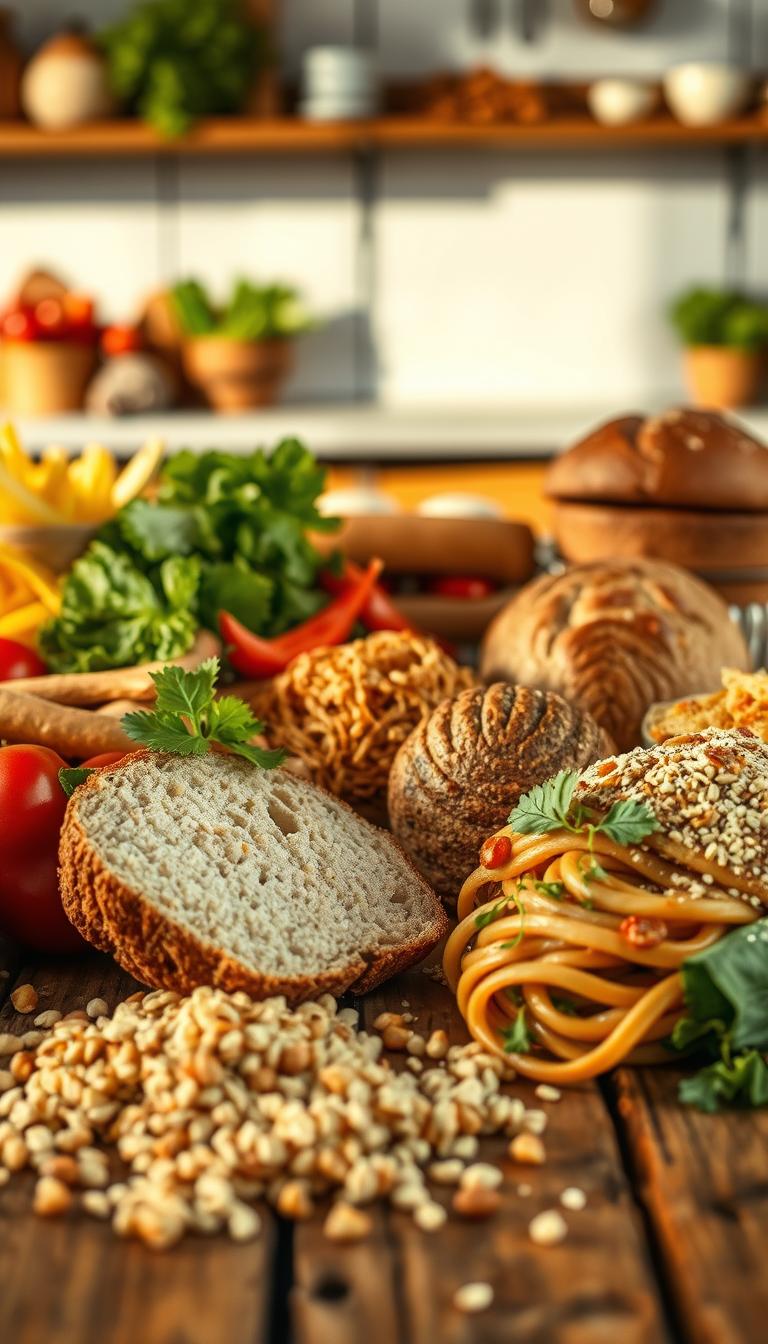Psyllium is a versatile dietary fiber used in both the food and pharmaceutical industries. Known for its multiple health benefits, this soluble fiber has become an essential tool for improving our quality of life.
Among its main uses is its ability to relieve constipation and improve the texture of gluten-free recipes, making it ideal for those looking for gluten substitutes. Furthermore, regular consumption can contribute to better intestinal and overall health, according to studies and recommendations from international organizations.
In this article, we'll explore how psyllium can be incorporated into your daily diet, offering practical tips and delicious recipes so you can take full advantage of its benefits.

Key tips
- Psyllium is rich in soluble fiber, ideal for improving digestive health.
- It can help reduce LDL cholesterol levels and regulate blood sugar levels.
- It is an excellent option for gluten-free recipes, improving the texture of breads and baked goods.
- It is recommended to consume between 5-10 grams per day, accompanied by sufficient water.
- It is a useful tool in weight loss diets due to its satiating effect.
Introduction to psyllium and its importance for health
Psyllium, a soluble fiber extracted from the seeds of the Plantago ovata plant, has gained popularity in recent years due to its numerous health benefits. Its ability to absorb water and form a viscous gel makes it a key ally for improving bowel movement and relieving constipation.
Context and current relevance
Today, psyllium is considered an essential dietary supplement, especially for those looking to improve their digestive health. According to a study published in the American Journal of Gastroenterology, psyllium significantly improves bowel frequency in people with chronic constipation.
Psyllium is one of the most effective fibers for relieving constipation and improving intestinal health.
The role of fiber in a balanced diet
Fiber, especially soluble fiber, plays a fundamental role in our daily diet. It helps regulate blood sugar levels, reduce LDL cholesterol, and prevent constipation. Psyllium, by absorbing large amounts of water, forms a gel that facilitates intestinal transit.
| Benefits | Description |
|---|---|
| Improvement of intestinal transit | Reduces constipation and regulates bowel movements. |
| blood sugar control | Helps reduce postprandial glucose levels. |
| Cholesterol reduction | Lowers LDL cholesterol levels. |
Regular consumption of psyllium, accompanied by sufficient water, not only improves intestinal health but also contributes to better nutrient absorption and a more efficient metabolism.
What is psyllium?
Psyllium is a natural fiber that comes from the seeds of the plant plantago ovata, native to India and Iran. Known for its versatility, it is used in both the food and pharmaceutical industries.
Origin, composition and classification
This dietary fiber is extracted from the seeds of plantago ovata, a plant grown primarily in regions with arid climates. Psyllium is composed of a mixture of soluble and insoluble fiber, making it particularly useful for improving digestive health.
Differences between psyllium husk and psyllium powder
Psyllium husk, which comes from the seeds, is larger and may contain more impurities. On the other hand, powdered psyllium is obtained through a milling process, which makes it finer and purer.
- The shell is used in gluten-free recipes and as a dietary supplement.
- The powder, further processed, is commonly used in baked goods and as a food additive.

Psyllium powder is ideal for those seeking a softer texture and better absorption in culinary recipes. Its classification as a soluble fiber makes it essential in diets seeking to control blood sugar and lower cholesterol.
Main benefits of psyllium in food
Psyllium is a natural fiber that offers multiple health benefits. Its main benefits include improving intestinal transit and reducing cholesterol and blood sugar levels.
Laxative effect and improvement of intestinal transit
Psyllium acts as a natural laxative, absorbing large amounts of water and forming a gel that facilitates bowel movements. This effect is especially useful for relieving constipation and regulating bowel movements. According to a study published in the American Journal of Gastroenterology, psyllium significantly improves bowel frequency in people with chronic constipation.

Cholesterol reduction and glucose control
In addition to its laxative properties, psyllium helps reduce LDL cholesterol levels and regulate blood sugar levels. This is due to its ability to absorb liquids and form a gel that slows glucose absorption in the intestine. A recent study showed that consuming 10,2 grams of psyllium per day can help maintain lower blood sugar levels.
These benefits make psyllium an essential tool for improving cardiovascular health and preventing associated diseases.
In short, psyllium is an excellent option for those looking to improve their gut health and naturally lower their cholesterol and blood sugar levels.
Psyllium benefits and use in daily diet
Psyllium has become an essential ally for those seeking to improve their health through nutrition. Its versatility in recipes and its positive impact on the body make this soluble fiber an indispensable tool in the daily diet.
To integrate psyllium into your routine, you can start by adding it to your smoothies or shakes. A teaspoon of psyllium powder mixed with enough water before breakfast can make a difference in your digestion and weight control. It's also ideal for gluten-free bread recipes, improving the texture and providing more fiber.
- The recommended intake is 10 grams per day, divided into two or three doses.
- It is important to take it with enough water so that the fiber is properly hydrated.
- If you're on a weight-loss diet, psyllium will help you feel full longer by reducing your appetite.
A recent study showed that consuming psyllium regularly can help reduce blood sugar and LDL cholesterol levels., which is beneficial for cardiovascular health. In addition, its natural laxative effect relieves constipation and improves bowel regularity.

To maximize its benefits, be sure to take the right amount and drink plenty of water. With psyllium, every day can be an opportunity to nourish your body in a healthy and balanced way.
Psyllium applications in gluten-free recipes
Psyllium has become an essential ingredient for those looking to create delicious gluten-free recipes. Its ability to improve the texture and cohesion of doughs makes it ideal for breads, puddings, and cakes.
Improves texture and cohesion in masses
Psyllium acts as a natural gluten substitute, allowing gluten-free doughs to acquire a fluffier and juicier texture. By absorbing water and forming a gel, this ingredient helps bind the dough components together, preventing them from crumbling.
Use in breads, puddings and cakes
In gluten-free breads, psyllium improves the crumb and volume, making them more similar to traditional breads. In puddings and cakes, it acts as a natural thickener, providing a smooth and pleasant texture. A tablespoon of psyllium powder can make a difference in the final consistency of these products.
| Benefits in recipes | Description |
|---|---|
| Improves texture | Makes gluten-free doughs fluffier and juicier. |
| Increase the volume | It allows gluten-free breads and cakes to have a volume more similar to that of traditional ones. |
| Acts as a thickener | It is ideal for puddings and sauces, offering a smooth texture. |
To achieve the perfect balance, it is recommended to use between 5 and 10 grams of psyllium per 500 grams of gluten-free flour. This ingredient not only improves the texture but also adds additional fiber to your recipes.
If you are looking for more inspiration, you can find delicious recipes that use psyllium as their main ingredient. Discover how this ingredient can transform your culinary creations!
Tips for proper consumption of psyllium
To take full advantage of psyllium's properties, it's essential to follow some basic guidelines. This supplement, although natural, must be consumed appropriately to avoid unwanted side effects.
Recommended dosage and methods of administration
The recommended daily dose varies according to individual needs. For adults, it is suggested to start with 5 grams per day, divided into two or three doses. It is important to mix each dose with at least 240 ml of water to ensure proper absorption.
In the case of children between 6 and 12 years, the dose is reduced by half, i.e. 2.5 grams diluted in sufficient liquid. This adjustment helps prevent possible digestive discomfort.
| Shot | Description |
|---|---|
| Adults | 5 grams per day, divided into 2-3 doses, mixed with 240 ml of water. |
| Children (6-12 years) | 2.5 grams per day, diluted in sufficient liquid. |
| Administration | Take preferably 30 minutes before meals to improve appetite control. |
Precautions and potential side effects
Excessive consumption without adequate water intake can cause constipation or bloating. It is also important consult a doctor if you are taking other medications, as psyllium may interfere with their absorption.
Psyllium, although natural, should be used with caution, especially in children and people with specific medical conditions.
The most common side effects include gas and abdominal pain. If these symptoms persist, it is recommended to discontinue use and seek medical advice.
Integrating psyllium into a healthy lifestyle
A healthy lifestyle is not only about a balanced diet, but also about enjoying welcoming environments that nourish both body and spirit. In this context, psyllium becomes an essential ingredient, offering numerous benefits for our health and well-being.
Pistachio Coffee Brunch: Examples of Healthy Eating in Tenerife
In Los Cristianos, Tenerife, Pistacho Coffee Brunch stands as a benchmark for healthy food. This establishment, located in Christian Avenue, 12, opens its doors 8:00 - 20:00, offering an atmosphere that combines a sunny terrace with a climate-controlled interior. Its menu includes delicious recipes that incorporate psyllium as a natural source of fiber, ideal for those seeking a balanced diet.
Their specialties include smoothies and light dishes, where psyllium is mixed with fresh ingredients, enhancing the flavor and nutritional benefits. One example is their oatmeal with fruit and psyllium, an ideal option to start the day with energy and fiber.
Pistachio Coffee Brunch: Enjoy in Donostia and beyond
In Donostia, Pistacho Coffee Brunch has extended its magic to Calle de San Martín, 45, with schedules of 9:00 - 19:00This establishment maintains the same healthy spirit, offering a cozy atmosphere with a terrace perfect for enjoying the Basque climate. Their commitment to quality and innovation makes them a benchmark for healthy food lovers.
In addition to its locations in Tenerife and San Sebastián, Pistacho Coffee Brunch is expanding its presence in other cities, bringing its philosophy of health and flavor to more corners of Spain. Its success lies in the perfect combination of natural ingredients, such as psyllium, which not only improves the texture of its dishes but also provides benefits for intestinal and general health.
A good lifestyle includes both proper nutrition and pleasant dining environments, where every bite is a celebration of health and well-being.
Visiting Pistacho Coffee Brunch is more than just a meal; it's an experience that nourishes body and soul, highlighting the value of psyllium as a key ingredient in a balanced and healthy diet.
Other applications and clinical perspectives
Beyond its nutritional uses, psyllium has proven to be a valuable tool in various clinical applications. Recent studies have delved into its role as a therapeutic agent, highlighting its ability to reduce cardiovascular disease and improve the digestive system.
Scientific studies and recommendations from international organizations
Research published in specialized journals such as American Journal of Gastroenterology Researchers have confirmed that psyllium significantly improves bowel frequency in people with chronic constipation. Furthermore, international organizations recommend its consumption to reduce LDL cholesterol levels and regulate blood sugar levels.
The prebiotic role and long-term benefits
Psyllium acts as a prebiotic, promoting the balance of the intestinal microbiota. This effect not only improves digestive health but also contributes to the prevention of intestinal-related diseases. Studies have shown that regular consumption can reduce the risk of cardiovascular disease., thanks to its ability to control cholesterol and regulate blood sugar levels.
Psyllium is one of the most effective fibers for relieving constipation and improving intestinal health.
For more information on the studies that support these findings, you can consult this investigation.
Conclusion
Psyllium, a soluble fiber derived from the seeds of the plant plantago ovata, has become an indispensable ally for our health. Throughout this article, we have explored its many benefits. expected benefits, from its ability to relieve constipation and improve intestinal health, to its role in lowering cholesterol and controlling blood sugar.
This versatile fiber is not only an essential ingredient in gluten-free recipes, improving the texture of breads and baked goods, but is also used in clinical applications. Scientific studies They have demonstrated their effectiveness in regulating intestinal transit and their positive impact on cardiovascular health.
To enjoy your and advantages, it is important to consume it in the quantities suitable, accompanied by enough water. If you're looking for inspiration, you can explore delicious recipes at this guide or visit PISTACHIO Coffee Brunch, where psyllium is integrated into healthy and nutritious dishes.
In short, psyllium is a natural and effective tool for improving your digestive and overall health. Give it a try and discover how it can transform your daily diet!







